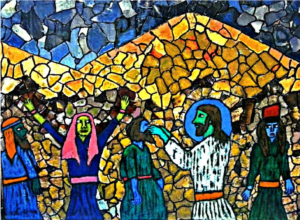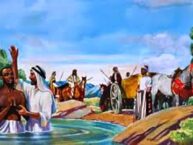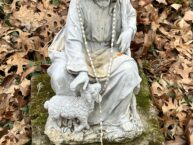 October 28, 2018: May God’s words alone be spoken, may God’s words alone be heard. Amen.
October 28, 2018: May God’s words alone be spoken, may God’s words alone be heard. Amen.
There is so much going on in our gospel story today that it would take many hours to unpack it all; but don’t worry, I will not be trying to go back to my Baptist roots and go beyond the Episcopal sermon time limit, in which 15 minutes is pushing it, and 20 minutes means folks signal the organist to play “get off the stage” music like the Oscars.
Jesus is walking along with his peeps on their way out of Jericho when Bartimaeus, a blind man, shouted out to him. The disciples are trying to quiet him, but he just shouted all the louder “Jesus, Son of David, have mercy on me!” Jesus tells his disciples to call the man over, they do, and so Bart then throws off his cloak and runs toward him. Jesus asks him what he wants? An odd sort of question, don’t you think?, but a sermon for another day. Bart responds “My teacher, let me see again.” Jesus heals him and tells him to “Go! Your faith has made you well.”
One of the things that jumped out at me was this: When Bart shouts out through the crowd, Jesus does something – or really, doesn’t do something – the text says that “Jesus stood still.” In all three versions of this story in our synoptic gospels – Matthew, Luke, and this one in Mark – this statement is made “Jesus stood still.” It appears no where else in our bible, just in this story of Bart, the blind guy.
“Jesus stood still.”
Now, one of the things about our fabulously rebellious Savior is that he wasn’t one to let moss grow under his sandals. This was a guy on the move. Even when he did try to take rest, folks would break through to find him. So I think we need to stand still for a moment ourselves, and think about this – about Jesus standing still – about why it matters to us now in this tumultuous time in the world, and in this time for the church.
Because I have news for you…this gospel is our story today – and it is a reformation story.
Now some denominations, including the one I grew up in, celebrate Reformation Sunday today. And if there was ever a time for a reformation of our church, it is now, and this gospel is the message of reformation we need.[1]
This past week there was a time when I was able to stand still too – it was at our annual Clergy Conference at the Shawnee Inn on the Delaware River. It is something I look forward to every year, but as usual, while I love the time spent with my colleagues – I get so much from them in both conversation and in prayer – the workshop facilitator was less than inspiring. One thing that struck a nerve was something we hear a lot in the church today – “don’t try to grow the church, it isn’t possible,” he said. To which I muttered under my breath “apparently you need to come see my church sometime, because we are growing.”
And while that was not this facilitator’s exact meaning, it is part of the growing chorus of folks proclaiming the death of the church. We see the declining numbers overall and lament that there is nothing to be done about it, as we read the latest article about the death of Christianity. It reminds me of an old story about the Father of the reformation celebrated this Sunday, Martin Luther.
Luther once spent three days in a deep depression, reacting to something that had gone wrong in his life. On the third day his wife, a former nun named Katharina von Bora, came downstairs dressed all in black — mourning attire.
“Who’s dead?” Luther asked her.
“God,” she replied.
“What do you mean, God is dead? God cannot die.”
“Well,” his wife replied — wiser, I would argue, than he — “the way you’ve been acting I was sure he had!”
God cannot die.
Jesus lives!
Here’s the thing about this “death of the church,” thing… What they really mean is – the death of the church as we once knew it. On that, they are right. And forthat, I give thanks.
Now, you may think that is just plain nuts. No, not really. Because what the folks are crying out for is the church of the crowds, not the church of Bartimaeus – the person Jesus stood still for, the person Jesus called. This is the reformation the church needs right now – a Bartimaeus reformation.
As a favorite commentator from Lutheran Seminary, Dr. Karoline Lewis, noted: “The church desperately needs a “take courage, get up, he is calling you,” kind of reformation. A reformation with courage and heart at its center, that doesn’t sit there silently, but answers God’s call to resistance and persistence and then follows along the way… A reformation that doesn’t listen to the loudest voices, those voices that simply support the idols of prestige and privilege, of patriarchy and power, but challenges those voices, insisting that the Gospel word is the liberating word that might truly save the world.”
Indeed, Dr. Lewis, the gospel IS “the liberating word that might truly save the world.” And today’s passage from the gospel can save us, the people of Christ, the church most especially, because Jesus is calling for us too! He is calling us, healing us, and then… just as he did with Bartimaeus, telling us to Go! And were are we to go? Remember that after he is healed, Jesus says to Bartimaeus “Go; your faith has made you well.” And where does he choose to go? With Jesus.
Oh how we need to be Bart – because…we need to be Jesus.
And as Jesus, we need to stand still…but only for a moment, that we might hear the voices around us. And when we do, we will hear what we heard this week, the hate, anger, pain and violence in the world today.
This week has been frightening and full of sorrow for what we witness happening in our country. It began earlier when our own government’s leaders refer to those who walk together for safety in their long and arduous journey – fleeing their countries out of fear with not much but what they could carry in their arms, including their children – when they talked about them as a caravan coming to take our jobs. They could not see them as they are – people crying out for help, for mercy. Instead, using them as political foil – instilling fear and hatred of those whose faces are brown to gin up votes.
And speaking of votes, the news is filled with stories of voter suppression in, you guessed it, areas where the faces are more brown and black rather than white.
If that were not enough, bombs were sent to those whom our President calls out at his rallies as enemies – those that dare speak out, his critics. And one sad and lost soul heard him, and took his words to heart – mailing 14 bombs to the homes and offices of critics of the President. Thankfully, none of these hurt anyone. And yet, to add even more pain, some deny truth – saying that this was some sort of hoax. They have decided that their own political agendas are more important than fact, than truth, than the safety of the people of our country.
And sadly, that was not the end of our troubling news, as a man armed with an assault rifle and other weapons entered a synagogue yesterday – on the Jewish sabbath – and started shooting – resulting in multiple casualties. According to the news, the shooter was known for his anti-Semitic rhetoric, considering the migration of Jews into our country as a “infestation” of “invaders,” that not even our President was doing enough to curtail. To this terrorist, even a man such as our nation’s leader, who thinks that neo-Nazi’s are good people isn’t enough of a nationalist, even he isn’t enough of a racist or anti-Semite. For this shooter, Jews were nothing but a group of people he labeled as mere insects because of what they believe, insects he intended to exterminate. I hope that Christians everywhere were considering what this man did, and remembering that Jesus was a Jew.
Isn’t it the case that when tragedy strikes, we tend to get stopped in our tracks, right? We stand still. It is what enables us to so vividly remember where we were when we heard the news – when JFK or Dr. King was shot, or the Challenger explosion, 9/11, the Orlando massacre, and now Squirrel Hill. We are changed.
Jesus stood still this week.
We stood still this week – and I wonder what we heard.
Did we hear the Bartimaeus in our midst – the people who are being marginalized and oppressed – the immigrant, the poor, the differently abled, the people of color, the LGBTQ people, the people of other faiths…did we? Did we hear them?
Do we hear Jesus?
Do we hear that news – the good news?
Because Jesus is calling us too?
See, that’s the radical twist in this gospel. We so often focus on Bartimaeus, that we lose sight, pun intended, of something very important, and it is this. Jesus, having stood still, heard the voice crying out to him, and empowered his disciples to go to this man. They said to Bart “Take heart; Get up, he is calling you.”
“Take heart; Get up, he is calling you.”
What makes that so jarring is that these were the same followers of Jesus who were telling Bart a few moments earlier to be quiet. They refused to see him, to include him…until Jesus sent them. Then they said “Take heart; Get up, he is calling you.”
Jesus is standing still too – hearing us, the church, lamenting our supposedly crippled or dying institution – and he is calling us to a new reformation – a new way of being. If we want to see this and what is possible, we need only look to another news story, one that got buried (quite literally) in the news cycle – that set an example for us on how this reformation should go – how it is going – because it has been in the works for a while. It was the story of a burial.
Twenty years ago, a young man was brutally beaten and left to die in a position that mirrored a crucifixion – his arms stretched out across a fence, and his body left dangling in this deserted area outside of the town of Laramie Wyoming- he was crucified for being gay. This man, whose image is one of the ones we nailed to the cross this past Good Friday, was Matthew Shepherd, and his death was a turning point for us as a nation, and as a church, with regard to the right to dignity and respect for all LGBT people.
And yet, after 20 years, Matthew was not put to rest. His parents were fearful that wherever he was buried, it would be desecrated. They had a right to think that way, as people did flock to the place where he gave his final breath – some to lay flowers, but some with signs denouncing this victim of hate with more hate.
And so it was wonderful this week to hear the news that Matthew was finally laid to rest – at the National Cathedral, ourEpiscopal cathedral in Washington, DC. I was never more proud to be a member of this branch of the Jesus Movement as on that day. For in the midst of a week in which hate seemed to triumph, we, the Episcopal Church, in the words of one of our bishops, the Rt. Rev. Gene Robinson, who is himself a symbol of what has transpired in the years since inside the church, said “Welcome home, Matt.”
Matthew’s father put it this way, ““Matt was blind just like this beautiful house of worship. He did not see skin color. He did not see religion. He did not see sexual orientation. All he saw was a chance to have another friend. Just like this beautiful home we have here right now.”
“Matt was blind.” Or put another way – Matthew Shepherd was the Bartimaeus whose gruesome death became the voice of a people crying out that made Jesus stand still, not to heal them – for they were not the ones who were blind, but to heal us – the ones who for so many hundreds of years told LGBTQ people to be quiet and live in spiritual pain. Heal us, that we may take heart, and follow him that we may go to the ones crying out for mercy, for grace, for love.
When Matthew died, we all died too. But like Jesus, we were resurrected. we were not the people we needed to be, but we have changed – or perhaps really, reformed ,to be the people Jesus needs us to be, and we have more we need to do.
As part of our stewardship season, you will receive a gift blessed at the altar. Today it is five sticks, like the ones you used to put together when you were little – the popsicle sticks – only these have notches in them. You will need five, so you can put it together like this – this looks like a post fence, doesn’t it? Matthew Shepherd was crucified on a post fence. I ask that you take time this week to stand still, stand still and look at this fence. Look at it and remember Matthew, and then take heart, and follow Jesus, for he will heal you, and empower you to do the work you are called to do – to follow him.
God is not dead, and neither is the church, but we are in need of a reformation – one where we cast off our cloaks and respond to the call of Jesus – the cloaks of valuing doctrine over justice, dogma over compassion, tradition over love – that we might run to Jesus for healing from our spiritual blindness.
This is a reformation for our very soul. And it’s gonna require a lot from us.
It’s gonna require that we stop and stand still – to hear the call of the broken – to hear our own voice in that call.
It’s gonna require that we throw off the cloaks of our own fear – that we may be healed.
It’s gonna require that we take heart and respond to Jesus calling out to us to get out of our pews, off of the sidelines, and come to him – in the Eucharist, and in the streets.
And, it’s gonna require that once we meet him, we go with him – be him, that we may hear the call of others and heal a broken world with the same medicine he used for Bartimaeus – the healing balm of God’s all inclusive love.
Amen.
For the audio from the 10:30am service, click below, or subscribe to our iTunes Sermon Podcast by clicking here:
[1]From the ideas contained in the commentary “Reformers In Our Midst” by Dr. Karoline Lewis.
The Rev. Diana L. Wilcox
Christ Church in Bloomfield & Glen Ridge
October 28, 2018
Pentecost 23 – Year B – Track 2
1st Reading – Jeremiah 31:7-9
Psalm 126
2nd Reading – Hebrews 7:23-28
Gospel – Mark 10:46-52






